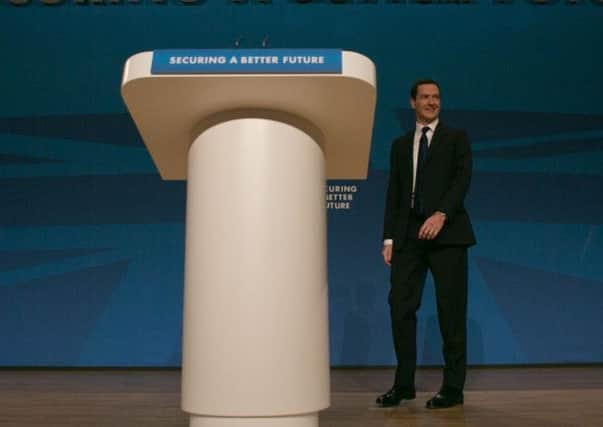Leaders: Osborne’s austerity offers Labour a challenge


The inheritance tax cuts he offered at the Conservative Party conference do not, in the big public spending picture, amount to much – about £150 million a year, the Treasury estimates. But the freeze he proposes on unemployment and low pay welfare payments is a much bigger deal, estimated as likely to save about £3 billion. Working out the political arithmetic behind these measures is not hard.
The inheritance tax cuts will only benefit the better off. People who have built up the kind of pension pot which would benefit from this measure generally do not have poverty-stricken offspring for whom this measure would be a massive boon.
Advertisement
Hide AdAdvertisement
Hide AdInheritance taxes are, however, a bugbear of older Tories. They do not see, if they have done the right thing all their lives to remain independent of the state by building up a significant private pension fund, why the state should be the major beneficiary when they die and not their children, to whom they hoped to pass on their accumulated wealth.
This is about pleasing the core Tory vote which might otherwise be susceptible to the siren calls of Ukip. They are also likely to be pleased by the promise of yet more real terms cuts in welfare payments, and by yet more austerity to be applied to public sector pay.
But it won’t be greeted joyously by the millions of people dependent on welfare or who work in the lower-paid ranks of the public sector.
The only good thing to be said about this is that it means there will be a clear choice offered to voters next May. The difference in what the main UK parties will be promising should be very clear – provided, that is, that the Labour Party can rise to the challenge.
Dealing with the tax revenue shortfall on public spending is a major worry for people who are genuinely worried by the large national debt the government is continuing to pile up. But most of the poorer people in Britain’s society also reckon that they have borne enough austerity already and do not see, if the economy is growing as fast as Mr Osborne says it is, why they should bear any more.
Labour needs to provide a very clear plan for dealing with these concerns. So far, the party leaders have failed to do that.
And the mass desertion to the independence cause in the referendum should be a clear warning of the dangers it faces next May if it does not produce a clear strategy.
China in Hong Kong dilemma
FOR the past two decades, China’s Communist Party rulers have relied on the rapidly rising prosperity of the masses in an economic boom to marginalise any dissent there may be about their dictatorial rule. Given plenty of bread, the Chinese people have seemed content to do without the circuses of democracy and liberty.
Advertisement
Hide AdAdvertisement
Hide AdBut not any more in Hong Kong. Sustained protest is being made against the intention of the Beijing government to control elections to Hong Kong’s 70-seat legislature by vetting all candidates and, presumably, rejecting those it does not like.
The disruption caused by the tens of thousands of protestors, who have blocked main roads and shut down parts of the business district, present a severe dilemma to Beijing.
It could suppress the protests, but if it does so in the violent way it suppressed the 1989 Tiananmen Square protests, it will not only draw worldwide condemnation but severely damage Hong Kong’s economy, which earns Beijing a lot of money.
If it allows the protests to continue, it risks the same pro- democracy movement spreading to its mainland cities, a fear shown by the government’s shutting down of social media networks.
For the moment, Beijing seems to be relying on Hong Kong’s police to contain the demonstrations and to gradually reduce them with mass arrests, while keeping the People’s Liberation Army and its tanks in their barracks.
If the Chinese government wants to show that it is a mature country fit to play a leading role in the world, then it needs to treat the protestors with respect. The agreement signed when Britain handed the colony to China promised democratic elections. That promise should be honoured.